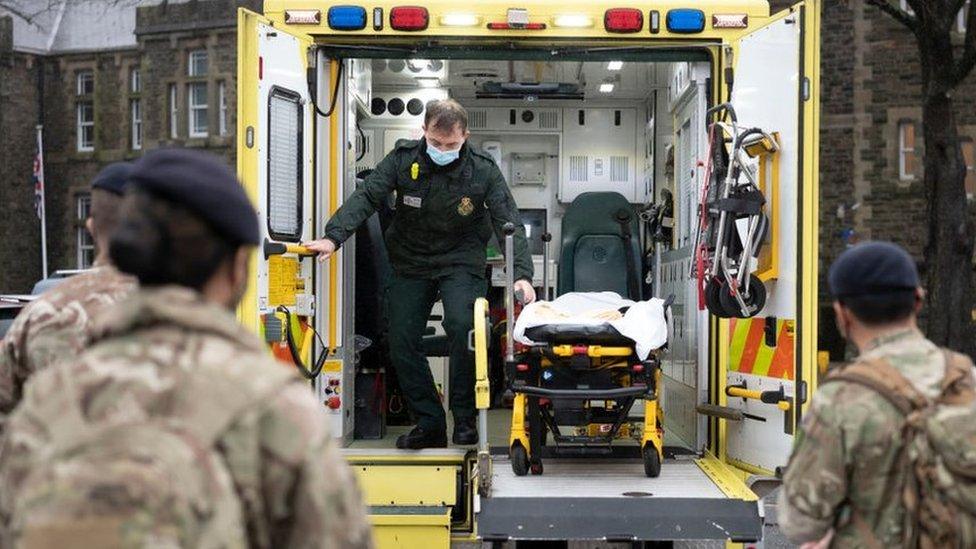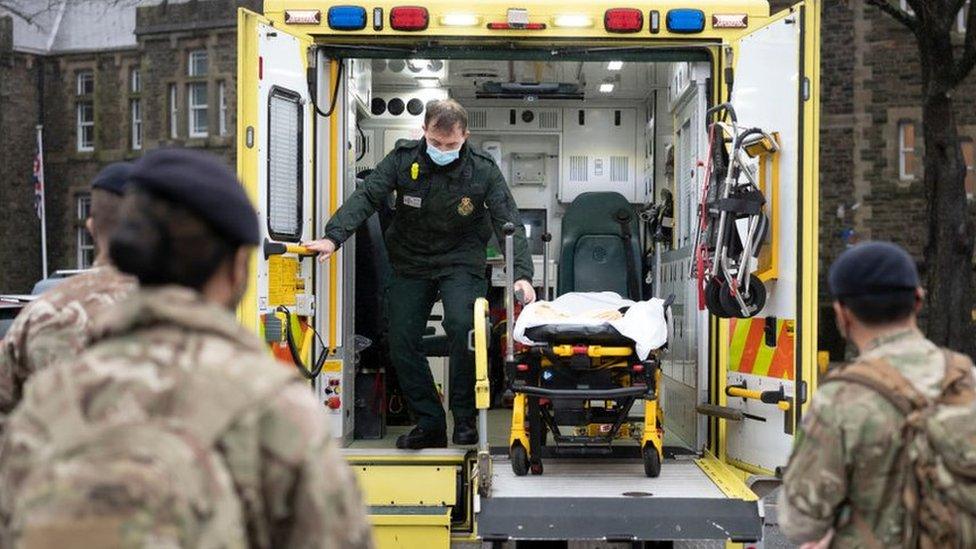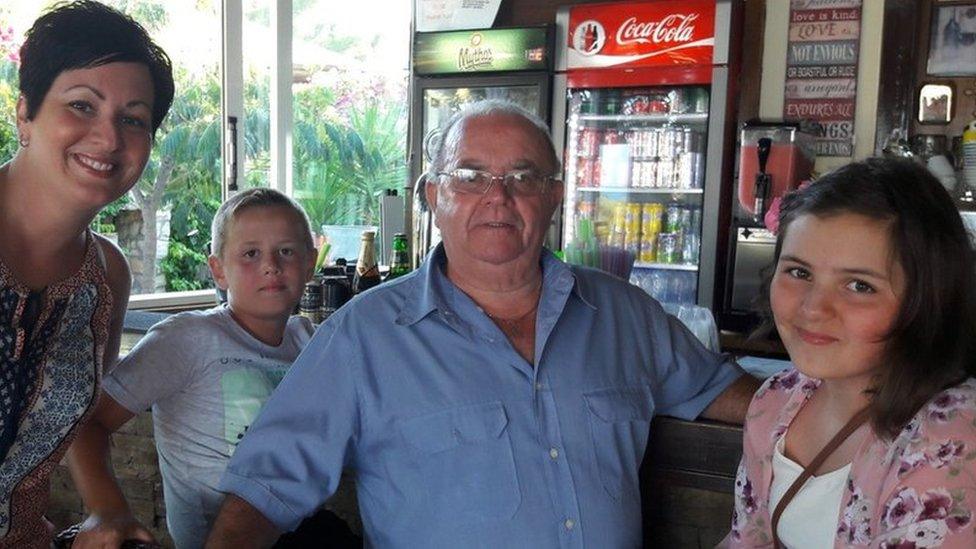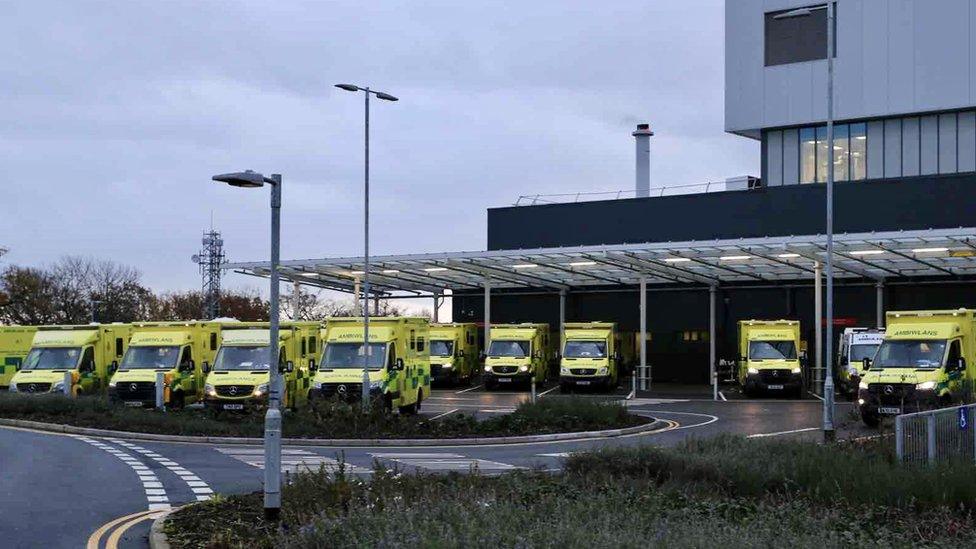Covid: Safety fears over Welsh ambulance military support
- Published

The military has been assisting the ambulance service across the UK
Paramedics fear they cannot do their job safely due to being forced to work with the armed forces on ambulances, a union has warned.
More than 100 military personnel were brought in to help the Welsh Ambulance Service cope with Covid pressures.
But the GMB said they provide "very little assistance", put more pressure on the trained medics and that without action the service will collapse.
The union has raised its concerns with Welsh Health Minister Eluned Morgan.
A Welsh government spokesman said: "Operational issues are decisions for the Trust to take and we are aware the Trust is working with staff and staff representatives to listen to concerns and resolve these in partnership at an organisational level."
The Welsh Ambulance Service said it was aware of concerns but insisted it would not "stand by" at a time of unprecedented demand and that the extra manpower provided by the armed forces had enabled it to deploy extra vehicles and crews.
The Trust is due to meet with union officials next week.
However the GMB also said its members are being threatened with suspension or disciplinary action if they raise the problems and "being bullied and forced to split from their regular trained crew partner to crew up with the untrained military".
Since mid-October 129 personnel from the Army, Navy and RAF, external have been working with the Welsh Ambulance Service, and are due to continue doing so until the end of November.
The deployments were announced last month, to work as non-emergency drivers on lower priority calls and free up ambulance resources for emergency calls.
But the union says military personnel are being sent to "emergency situations".
In a letter to Ms Morgan, the GMB says "military personnel are not able to drive the ambulances on emergency status with the use of 'blue lights and sirens' and, as they are not trained as paramedics, they are providing effectively very little assistance to our members".
A man whose 85-year-old dad had to wait 13 hours for an ambulance said it was "the longest night of my life"
The union says ambulance staff "are having to not only assess and treat the patient and their family, but keep an eye open for the military personnel working with them, giving them instructions on what is needed to be done rather than being able to rely on a trained medic".
It added: "Our members are reporting that some military personnel are reporting to them that they are not comfortable dealing with emergency work and have not had to deal with medical emergencies like death before.
"This is putting extra pressure on already pressured medics and also putting the military personnel into situations that could harm them with the knock on affect of endangering the public."
'Perfect storm'
The union says the situation is making staff ill.
"Several of our members have informed us that the reason for their ill health is directly as a result of being forced to work with untrained unqualified people which has affected their ability to sleep due to increased pressures," it told the health minister.
"We believe this is a perfect storm, that if not dealt with quickly, will result in the complete collapse of the service."
The GMB says it is entering into dispute with the Welsh Ambulance Service on the matter.
The service said it was committed to working with the union to address concerns but had seen examples of staff and military personnel "working positively" and no evidence of a systematic issue.
'Distressingly long waits'
Jason Killens, chief executive of the Welsh Ambulance Service, said: "We understand some colleagues are concerned about the appropriateness of military support.
"But given high levels of absence, greater demand than ever before and extended delays at hospitals, the Welsh Ambulance Service has taken a decision that it is not prepared to stand by and see a significant number of patients experience distressingly long waits in the community because of a lack of available resources.
"In the month since the latest military deployment, and whilst delays at hospitals have remained challenging, we have had the capacity to respond to more patients and in a more timely way.
"This is the result of being able to make more vehicles and crews available because of the support we are receiving from military colleagues."
- Published7 October 2021

- Published5 November 2021

- Published7 October 2021
